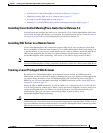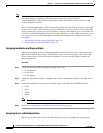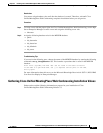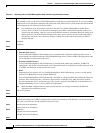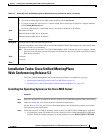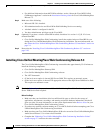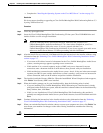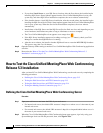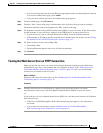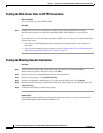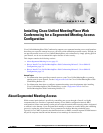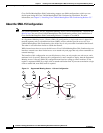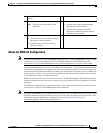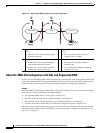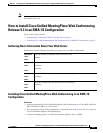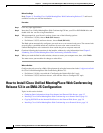
2-13
Installation and Upgrade Guide for Cisco Unified MeetingPlace Web Conferencing Release 5.3
OL-10029-01
Chapter 2 Installing Cisco Unified MeetingPlace Web Conferencing Release 5.3
How to Test the Cisco Unified MeetingPlace Web Conferencing Release 5.3 Installation
• If you are on an internal web server, the Welcome page appears with your name displayed at the top.
To access the administrative page, click Admin.
• If you are on an external web server, the administrative page appears.
Step 3 From the Admin page, click Web Server.
Step 4 From the “View” section of the page, click the name of the web server that you want to configure.
Information about this web server populates the “Edit” section of the page.
Step 5 For Hostname, enter the fully qualified domain name (FQDN) of your web server. If this field contains
just the hostname of your web server, change it to the FQDN, that is, hostname.domain.com.
• If your web server is not in a Domain Name Server (DNS), insert the IP address instead.
• This hostname or IP address must be resolvable by its intended users. For details, see the “Testing
the Web Server Over an HTTP Connection” section on page 2-13.
Step 6 For Web Conference Active, choose Yes or No.
• The default is Yes.
• Choosing No means that this web server will not host meetings.
Step 7 Click Submit.
Testing the Web Server Over an HTTP Connection
Make sure that the web server can resolve itself using the hostname configured on the Web Server
administrative page. This is the hostname that you configured in Step 5 of the “Defining the Cisco
Unified MeetingPlace Web Conferencing Server” section on page 2-12 and is also the hostname
end-users use to connect to this web server.
Before You Begin
Define the web server. For instructions, see the “Defining the Cisco Unified MeetingPlace Web
Conferencing Server” section on page 2-12.
Procedure
Step 1 From the web server, use a web browser to connect to http://hostname.domain.com, where
http://hostname.domain.com is the Fully Qualified Domain Name (FQDN) of your web server.
or
If your web server is not in a Domain Name Server (DNS), use a web browser to connect to an IP address
from the web server.
• If the Cisco Unified MeetingPlace Web Conferencing home page appears, your connection is
successful.
• If you receive an error message, see the “Problems with Cisco Unified MeetingPlace
Web Conferencing Server Connections” section on page 6-3



